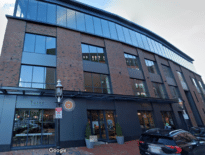Historic lab vacancies, rising distress in the office market and a steep decline in housing production weigh heavily on commercial real estate markets as 2025 begins.
Signs point to improving financing conditions and an uptick in transaction and development activity if the Federal Reserve proceeds with a pair of additional interest rate cuts. The result could jumpstart long-delayed groundbreakings and spur an increase in investment sales.
Developers and officials are set to haggle over the next generation of high-profile projects now in the initial stages for the Everett and South Boston waterfronts, while changes in development reviews in Boston and residential zoning across Cambridge could have far-reaching effects upon future projects.
Everett Soccer Stadium Showdown
Robert Kraft’s lengthy odyssey in search of Boston-area professional soccer stadium site was aided by Beacon Hill lawmakers. Now the New England Revolution and Patriots owner and development partners face a fast-track schedule to advance to the next round.
In November, the Legislature removed Kraft’s preferred Everett waterfront site from a marine port area zoning designation, opening up the 43-acre property to a wide range of commercial uses.
Proposed for a portion of the former Constellation Energy power plant property acquired by Wynn Resorts in 2023, the project still faces scrutiny from powerful forces.
Boston Mayor Michelle Wu has asked developers to provide the city with details on how the Sullivan Square area’s transportation network can handle the influx of game day visitors. And Boston-based Conservation Law Foundation has denounced the Legislature’s decision to include the zoning change in an economic development bill as backroom dealing.
Stadium developers have a May 1 deadline to strike agreements with the cities of Boston and Everett or face arbitration. The specifics of the project also will be reviewed by Everett officials and the state Executive Office of Energy and Environmental Affairs.
The stadium project would buoy Everett officials’ attempts to transform the industrial waterfront into a destination entertainment district including hotels, restaurants and recreation areas. The Davis Companies of Boston also has proposed a 7.2 million-square-foot mixed-use redevelopment at the nearby former Mobil Exxon fuel storage property. The initial phase includes a $500 million battery energy storage facility by Trimount Energy on a 21-acre portion of the 100-acre property.
Where To, Hasbro?
Massachusetts and Rhode Island officials are competing for bragging rights on a pending corporate headquarters location that pits sites in Boston against Providence.
Hasbro is scouting office and R&D space in and around Boston, seeking to tap into the local talent pool as it ramps up its turnaround strategy. The Pawtucket, Rhode Island game maker has set a goal of relocating in early 2026, potentially to Boston. Downtown office buildings and the Southline complex in Dorchester are reportedly under consideration for the company’s 250,000-square-foot space requirement near public transit.
Rhode Island officials have offered Hasbro an exclusive right to develop a new headquarters on the vacant parcel 42 in Providence’s I-95 Redevelopment District.
In Massachusetts, Hasbro is eligible for grants under the Economic Development Incentive Program, which offers tax credits in exchange for meeting job creation targets.
Cambridge Eyes Elimination of Single-Family Zoning
A landmark vote could usher in a new era of multifamily housing construction in Cambridge. The City Council is expected to vote in early 2025 on a city-wide rezoning plan designed to tackle the housing affordability crisis head-on.
Supporters say increasing density is the best bet for controlling housing prices. Median single-family home prices in the city topped $2.1 million in 2024, according to data compiled by The Warren Group, publisher of Banker & Tradesman.
For much of 2024, officials debated a plan allowing six-story buildings across the city. But in late fall, some officials predicted that a compromise reducing maximum building heights to 4 stories might be necessary to gain a majority vote of councilors.
Opponents argue that additional density will destroy the character of neighborhoods and encourage investors to acquire properties for redevelopment, accelerating gentrification and displacement.
Details Due on Gillette Campus Redevelopment
Gillette Corp. has given a glimpse of the future for its 31-acre waterfront site in South Boston, but specifics on the type of buildings and mix of commercial uses are yet to be revealed.
The pending relocation of manufacturing to Andover frees up the bulk of the “World Shaving Headquarters” campus on A Street. The mixed-use redevelopment would more than triple the square-footage of the existing factory and office buildings that occupy the Fort Point Channel-side site, the company notified the Boston Planning Department last summer.
Gillette indicated it will seek approval for approximately 5.8 million square feet of new buildings, including 1.7 million square feet of housing. The master plan and details on the location of individual buildings and uses is yet to be revealed, setting off a round of community meetings.
Boston Eyes New Development Rules
Real estate developers could have a new set of rules when seeking approval for most significant projects in Boston.
In the biggest change since the 1990s, the Boston Planning Department is in the midst of an overhaul of Article 80. The zoning article governs projects that are 20,000 square feet or larger, or include at least 15 housing units.
Flawed proposals would receive an early notification they do not comply, sparing developers the expense of proceeding with detailed designs. Impact advisory groups, which currently review individual projects, would be replaced by community advisory teams that review multiple projects in a neighborhood. And new definitions are added for community benefits required in exchange for approval.
A public comment period expired in December, clearing the way for a final version of the changes to be presented for approval by the Boston Planning & Development Agency directors and the Zoning Commission.
Suburbs Grapple with MBTA Communities Zoning
Faced with a year-end deadline to rezone areas for multifamily housing, suburban communities responded with a mixture of enthusiastic support, outright defiance and new districts carefully drawn to minimize opportunities for new development.
The Dec. 31 deadline applied to 130 cities and towns with MBTA commuter rail stations, and adjacent communities. Voters in Duxbury, Halifax, Hanover, Hanson, Marshfield, Winthrop and Wrentham all rejected multifamily zoning districts at town meetings as 2024 drew to a close, and will be out of compliance as of Jan. 1.
At least 18 communities have rejected or delayed approval of zoning plans designed to comply with the law. Opponents objected to state interference in local land-use decisions and potential increases in traffic and education budgets.
Towns in non-compliance face potential loss of discretionary state grants. The state Supreme Judicial Court is weighing Attorney General Andrea Campbell’s lawsuit against the town of Milton, which rejected a rezoning proposal in 2023 just before the deadline for communities with subway service.
“[One hundred and ten] communities have adopted zoning to comply, understanding that more housing is needed to reduce costs, grow our economy, and allow people to stay in Massachusetts,” Campbell said in a statement issued this week. “Communities must comply with the law or they risk consequences like the loss of certain state funding and potential enforcement action, and my office remains available to assist communities with compliance no matter their deadline.”









